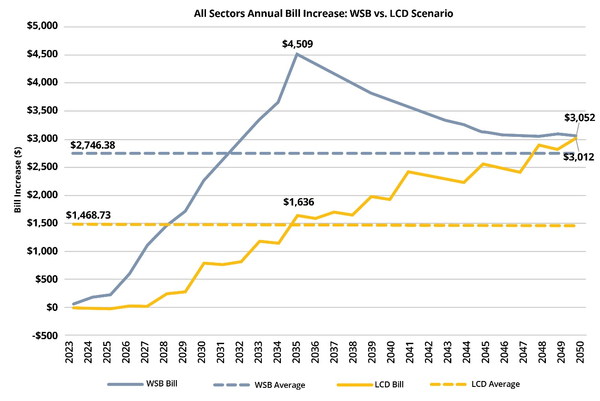A report about Michigan’s Healthy Climate Plan faces scrutiny over high costs, blackout risks, and minimal climate impact, according to new analysis.
Study projects steep cost increases and higher blackout risks under Whitmer’s climate strategy
A new report from the Mackinac Center for Public Policy claims that Governor Gretchen Whitmer’s push to achieve net-zero greenhouse gas emissions by 2050 through the MI Healthy Climate Plan could drive Michigan electricity costs up by $386 billion and increase the likelihood of extended blackouts.
The analysis, conducted in partnership with the Center of the American Experiment and Always On Energy Research, modeled two scenarios for meeting the state’s climate mandates. The first, a Wind, Solar, and Battery (WSB) approach, relies almost entirely on renewable energy and battery storage. The second, labeled Lower Cost Decarbonization (LCD), maintains coal and natural gas plants equipped with carbon capture technology and adds new nuclear capacity.
The report concludes that the WSB path would raise average monthly residential bills by 146% by 2035, to nearly $290, while potentially leaving residents without power for as long as 61 continuous winter hours. By contrast, the LCD option is projected to cost $180 billion less and avoid extended outages.
Bill increases could exceed $2,700 annually for Michigan households
Under the WSB scenario, annual household electric bills would rise by an average of $228 through 2050. Commercial and industrial customers would face similar percentage increases, which the authors warn could drive away businesses.
Michigan already has the highest electricity rates in the Great Lakes region and ranks near the bottom in service reliability, according to the Michigan Public Service Commission and Climate Central data. These deficiencies, the report argues, would worsen under an accelerated transition away from fossil fuels and nuclear power.
The WSB approach would require building over 40,000 megawatts each of wind and solar capacity and more than 25,000 megawatts of battery storage by 2035. That would mean tripling the state’s total generation capacity and expanding transmission infrastructure by an estimated $6.5 billion.
Minimal climate benefit projected despite large investment
Despite the high costs, the Mackinac Center modeling estimates the WSB plan would avert just 0.0015 degrees Celsius of global warming by 2100. “Forcing Michigan residents to endure extreme costs to achieve minuscule climate benefits is nonsensical and dangerous,” the authors wrote.

The LCD scenario, which uses carbon capture retrofits, reopens the Palisades Nuclear Plant, and builds new small modular and large-scale nuclear reactors, is projected to meet emissions goals without large-scale blackouts. This option would cost ratepayers an average of $1,469 more per year through 2050, significantly less than the WSB route.
Policy recommendations aim to slow plant closures and link rates to reliability
The Mackinac Center report outlines three recommendations for legislators:
- Halt early closures of coal, nuclear, and natural gas plants until equally reliable replacements are operational.
- Create a Reliable Portfolio Standard that factors the full system costs of renewables into utility planning.
- Enact an “Only Pay for What You Get” Act, limiting customer charges for intermittent generation to the proportion that actually contributes to grid reliability.
State law shifts control over wind and solar siting away from local governments
In late 2023, Michigan enacted legislation codifying the MI Healthy Climate Plan. It mandates 60% renewable power by 2035 and 100% clean energy by 2040, allowing nuclear and natural gas with carbon capture. The law also removed local authority over wind and solar siting, granting the Michigan Public Service Commission final decision-making power.
Commission Chair Dan Scripps argued the change was needed to prevent “projects of statewide importance” from being blocked over local objections. Critics say it strips communities of meaningful input.
Broader debate mirrors national and international energy struggles
The report notes that several countries, including the United Kingdom and Scotland, have scaled back net-zero commitments in recent years, citing costs and feasibility concerns. Major energy companies such as BP and Shell have also adjusted or abandoned some renewable targets.
The findings are likely to fuel debate in Lansing, where supporters of Whitmer’s plan argue that long-term climate and public health benefits outweigh near-term costs. Opponents point to the Mackinac Center data as evidence that Michigan risks repeating the grid instability and price spikes seen in parts of California and Europe.
Citations:
Mackinac Center for Public Policy. Michigan’s Expensive Net-Zero Gamble. Aug. 5, 2025.
Michigan Public Service Commission. Annual Report 2022. March 6, 2023.
Climate Central. Surging Power Outages and Climate Change. Sept. 14, 2022.
Read More Interesting Feature Stories From ThumbWind
- Michigan Feature News Stories – Unveiling the diverse and vibrant people, captivating places, and remarkable events that come together to make the Great Lake State unique.
- Strange Political News – A sarcastic take on official news from around the U.S., exploring the absurdities that often arise in the political landscape while providing a humorous perspective on current events and highlighting the quirks of politicians and policies.
- Michigan Hometown News – News and events from Michigan’s Upper Thumb region worth knowing, including local stories, impactful interviews, and updates on community happenings that shape the culture and lifestyle of the area.
Your Turn – Like This, or Hate it – We Want To Hear From You
Please offer an insightful and thoughtful comment. We review each response. Follow us to have other feature stories fill up your email box, or check us out at ThumbWind News.




